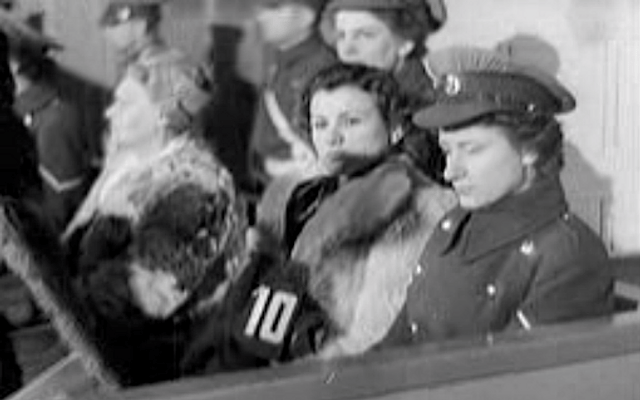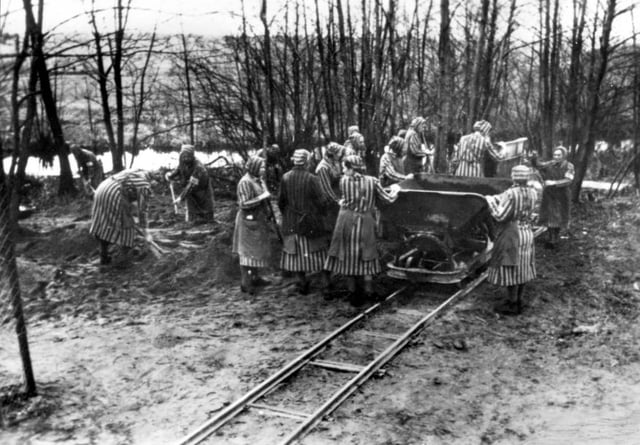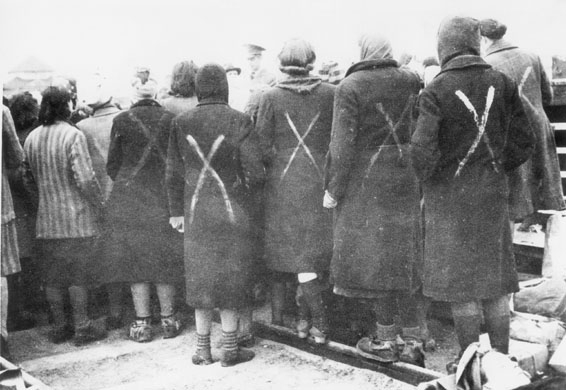Hamburg Ravensbrück trials

Hamburg Ravensbrück trials

| Hamburg Ravensbrück trials | |
|---|---|
| Court | Curiohaus, Hamburg, Germany |
| Started | December 5, 1946 (1946-12-05)(Rotherbaum case) November 5, 1947 (1947-11-05)(Friedrich Opitz case) April 14, 1948 (1948-04-14)(Uckermark trial) and more |
| Decided | July 21, 1948 (1948-07-21)(Rotherbaum case) |

The first Ravensbrück trial, 1947.[1] The sentencing, Hamburg, Rotherbaum
The Hamburg Ravensbrück trials were a series of seven trials for war crimes against camp officials from the Ravensbrück concentration camp that the British authorities held in their occupation zone in Germany in Hamburg after the end of World War II.[1] These trials were heard before a military tribunal; the three to five judges at these trials were British officers, assisted by a lawyer. The defendants included concentration camp personnel of all levels: SS officers, camp doctors, male guards, female guards (Aufseherinnen), and a few former prisoner-functionaries who had tortured or mistreated other inmates. In total, 38 defendants were tried in these seven trials; 21 of the defendants were women.[2] Executions relating to these trials were carried out on the gallows at Hamelin prison by British hangman Albert Pierrepoint.
All seven trials took place at the Curiohaus in the Hamburg quarter of Rotherbaum.
| Hamburg Ravensbrück trials | |
|---|---|
| Court | Curiohaus, Hamburg, Germany |
| Started | December 5, 1946 (1946-12-05)(Rotherbaum case) November 5, 1947 (1947-11-05)(Friedrich Opitz case) April 14, 1948 (1948-04-14)(Uckermark trial) and more |
| Decided | July 21, 1948 (1948-07-21)(Rotherbaum case) |
First trial

Female prisoners at Ravensbruck in 1939

Female prisoners gathered when the Red Cross arrive to Ravensbrück in April 1945. The white paint marks shows they are prisoners.[5]
The first Ravensbrück trial was held from December 5, 1946 until February 3, 1947 against sixteen Ravensbrück concentration camp staff and officials. All of them were found guilty. One died during trial. The death sentences (except for Salvequart) were carried out on May 2—3, 1947, in Hamelin prison.[3]
| Defendant | Function, Title | Sentence | |
|---|---|---|---|
| 1 | Johann Schwarzhuber | Deputy camp leader | Death, executed on May 3, 1947 |
| 2 | Gustav Binder (SS-Mitglied) | Warden | Death, executed on May 3, 1947 |
| 3 | Heinrich Peters (SS-Mitglied) | Warden | 15 years' imprisonment; released May 18, 1955 |
| 4 | Ludwig Ramdohr | Gestapo inspector | Death, executed on May 3, 1947 |
| 5 | Martin Hellinger | Medical doctor | 15 years' imprisonment; released May 14, 1955 |
| 6 | Rolf Rosenthal | Medical doctor | Death, executed on May 3, 1947 |
| 7 | Gerhard Schiedlausky | Medical doctor | Death, executed on May 3, 1947 |
| 8 | Percival Treite | Medical doctor | Death; committed suicide on April 8, 1947 before the sentence could be carried out |
| 9 | Adolf Winkelmann (Arzt) | Medical doctor | Died during the trial on February 1, 1947 |
| 10 | Dorothea Binz | Assistant Chief warden (Oberaufseherin) | Death; executed May 2, 1947 |
| 11 | Greta Bösel | Labor Department Head (Aufseherin) | Death; executed May 3, 1947 |
| 12 | Margarete Mewes | Jail Warden | 10 years' imprisonment; released February 26, 1952 |
| 13 | Elisabeth Marschall | Nurse | Death; executed May 3, 1947 |
| 14 | Carmen Mory | Inmate; Kapo | Death; committed suicide on April 9, 1947 before the sentence could be carried out |
| 15 | Vera Salvequart | Inmate; Kapo | Death; executed on June 2, 1947 |
| 16 | Eugenia von Skene | Inmate; Kapo | 10 years' imprisonment, released December 21, 1951 |
Three more defendants, the camp leader, Lagerkommandant Fritz Suhren, along with "work leader" Hans Pflaum and Schneidermeister Friedrich Opitz (below, see the Second Ravensbrück trial), escaped from prison prior to the first trial. The first two of them were apprehended under assumed names in 1949. They were handed over to French authorities, who were conducting another Ravensbrück trial in Rastatt at that time; both men were sentenced to death in that trial and executed by a firing squad on June 12, 1950. Opitz faced trial in November 1947.[4]
Second Ravensbrück trial
In the second Ravensbrück trial, which lasted from November 5 to 27, 1947, the only defendant was Friedrich Opitz age 49,[4] a clothing factory leader in the camp employed there from June 1940 till April 1945.[4] He was recaptured after his earlier escape from prison along with Fritz Suhren and Hans Pflaum (see above). During trial, he was convicted of beating women with truncheons, belts and fists, starving them for missing the quota, keeping them outside in very long roll-calls, and sending them to the gas chamber for (what he called) "being useless", as well as of kicking, at least one Czech female inmate, causing death. He also encouraged his guards to do the same. Opitz received a death sentence, which was carried out on January 26, 1948.[6]
Third Ravensbrück trial
In the third Ravensbrück trial, the so-called "Uckermark trial" which took place from April 14 to 26, 1948, five female camp officials of the satellite Uckermark concentration camp, were indicted for the mistreatment of women and the participation in the selection of women for the gas chamber.[7]
The Uckermark subcamp was located about one mile from the Ravensbrück concentration camp. It was opened in May 1942 as a prison or parallel concentration camp for teenage girls aged 16 to 21 dubbed criminal or difficult by the SS. Girls who reached the upper age limit were transferred back to the Ravensbrück women's camp. Camp administration was provided by the Ravensbrück main camp. In January 1945, the prison for juveniles was closed although the gassing infrastructure was subsequently used for the extermination of "sick, no longer efficient, and over 52 years old women" from Ravensbrück .[8]
| Defendant | Function, Title | Sentence |
|---|---|---|
| Johanna Braach | Criminal inspector; warden in the juvenile's camp | Acquitted |
| Lotte Toberentz | Camp leader of the juvenile's camp | Acquitted |
| Elfriede Mohneke | Assistant Chief warden of the extermination camp | 10 years of imprisonment; released June 14, 1952 |
| Margarete Rabe | Warden of the extermination camp | Lifetime imprisonment; reduced in 1950 to 21 years; released June 16, 1959 |
| Ruth Neudeck | Chief warden of the extermination camp | Death; executed on July 29, 1948 |
Braach and Toberentz were acquitted because they had worked at Uckermark only while it was still a juveniles camp, and there were no Allied women there at that time; the camp was exclusively for German girls, whose fate or treatment was outside the remit of the tribunal.
Fourth Ravensbrück trial
The fourth trial was held from May to June 8, 1948. The accused were all members of the medical staff of the camp at Ravensbrück, including one inmate who had worked as a nurse. The charges again centered on mistreatment, torture, and sending to gas chambers of women of Allied nationality.
| Defendant | Function, Title | Sentence |
|---|---|---|
| Benno Orendi | Medical doctor | Death; executed September 17, 1948 |
| Walter Sonntag | Medical doctor | Death; executed September 17, 1948 |
| Martha Haake | Nurse | 10 years' imprisonment; released on January 1, 1951 due to medical reasons |
| Liesbeth Krzok | Nurse | 4 years' imprisonment; released February 3, 1951 |
| Gerda Ganzer | Inmate; Nurse | Death |
Ganzer had already stood trial for her activities in Ravensbrück in 1946 before a Russian military tribunal and had been acquitted. In Hamburg, she was found guilty, but her death sentence was commuted into lifetime imprisonment on July 3, 1948, which in turn was reduced to 21 years' imprisonment in 1950 and then to 12 years in 1954. She was finally released on June 6, 1961.
Fifth Ravensbrück trial
In the fifth trial, three SS members were accused of having killed Allied inmates. The trial lasted from June 16 to 29, 1948. The judgments were handed down on July 15, 1948.
| Defendant | Function, Title | Sentence |
|---|---|---|
| Arthur Conrad | SS warden | Death; executed September 17, 1948 |
| Heinrich Schäfer | SS warden | 2 years' imprisonment; released October 28, 1949 |
| Walter Schenk | SS warden | 20 years' imprisonment; released August 3, 1954 |
Sixth Ravensbrück trial
This trial lasted from July 1 to 26, 1948. Both defendants were accused of having mistreated Allied inmates.
| Defendant | Function, Title | Sentence |
|---|---|---|
| Kurt Lauer | SS warden | 15 years' imprisonment; released May 7, 1955 |
| Kurt Rauxloh | SS warden | 10 years' imprisonment; released September 26, 1954 due to medical reasons |
Seventh Ravensbrück trial
Finally, six Aufseherinnen (female camp wardens) were tried from July 2 to 21, 1948. The charges were mistreatment of inmates of Allied nationality and participation in the selection of inmates for the gas chamber.
| Defendant | Function, Title | Sentence |
|---|---|---|
| Luise Brunner | Chief warden (Oberaufseherin) | 3 years' imprisonment |
| Anna Friederike Mathilde Klein | Chief warden | Acquitted due to lack of evidence |
| Emma Zimmer | Assistant chief warden | Death; executed September 20, 1948 |
| Christine Holthöwer | Chief Warden of Siemens | Acquitted due to lack of evidence |
| Ida Schreiter | Labor Department Warden | Death; executed September 20, 1948 |
| Ilse Vettermann | Warden | 12 years' imprisonment |
See also
Auschwitz Trial held in Kraków, Poland in 1947 against 40 SS-staff of the Auschwitz concentration camp death factory
Belsen Trial
Belzec Trial before the 1st Munich District Court in the mid-1960s of the eight SS-men of the Belzec extermination camp command
Chełmno Trials of the Chełmno extermination camp personnel, held in Poland and in Germany. The cases were decided almost twenty years apart
Dachau Trials, held within the walls of the former Dachau concentration camp, 1945–1948
Frankfurt Auschwitz trials running from December 20, 1963 to August 19, 1965
Majdanek Trials, the longest Nazi war crimes trial in history, spanning over 30 years
Mauthausen-Gusen camp trials
Nuremberg trials of the 23 most important leaders of the Third Reich, 1945–1946
Sobibor Trial, held in Hagen, Germany in 1965, concerning the Sobibor extermination camp officials
Treblinka trials in Düsseldorf, Germany